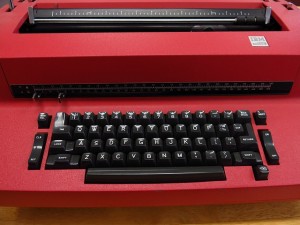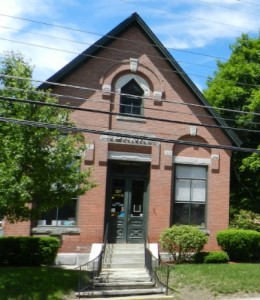
The two most important skills I learned in high school were typing and kissing.
Considering I was on the fast track for college and not secretarial school, I’m slightly astonished to admit that these skills have proved more useful than learning to solve a quadratic equation or reading Hamlet. It turns out that life is an arc that goes well beyond the single variable of the prolonged adolescence that kills the Prince of Denmark in the end.

My single-credit typing class met only a half hour a day for half a term. Every morning, we’d sit at our assigned IBM Selectrics, turn to a new page in the instruction manual, and practice learning each finger’s territory without looking at our fingers – like playing the piano, but easier. Osculation education was strictly peer-to-peer. We practiced kissing after school back stage and at the back of the bus.
I typed my way into college and through graduate school on a yellow Smith-Corona electric, and I travelled with a lightweight manual Olivetti – the analog equivalent of a laptop. On it, I ignored all the rules about margins I’d learned back in high school; I filled blue aerograms from edge to edge, licked them shut, and posted them to my parents and friends. Letters to romantic correspondents I sealed with both a lick and a kiss.
Happily, personal computers arrived just in time for my dissertation, a 300-page document with footnotes, which are notoriously difficult to set manually. By contrast, word processors format footnotes with ease. It’s no wonder then, I became an early adopter of technology. And for the most part, technology has improved my life.

As an inveterate letter-writer, I started sending email as soon as I could sign on with dial-up, and became impatient to connect via DSL. As the internet expanded, I welcomed both a wireless area network and a microcell tower into my home. Thanks to these techno gizmos, I keep a typed shopping list on my smart phone (there’s an app) and I borrow library eBooks for pleasure-reading in bed after I’m already tucked in.
But these quality-of-life issues are just the beginning. These gadgets and apps have also improved my professional life and reduced my carbon footprint. Lady Google allows me to do most of my research from home, and on-line databases allow me to perform bibliographical research in libraries whenever I want. And when one of my clients sends me a check by snail mail, I deposit it from home using my smart phone. Cool, right?

In truth, I miss the tellers at my local bank, who I used to see weekly. And sometimes, I don’t want to read through a hundred FAQs looking for an answer, or participate in a stilted, scripted, live-chat; sometimes, I want to talk to a human with a voice and a name.
I know when I push back against technology, I’m at risk of being left behind – an old fogey failing to assimilate into the digital age just the way my Russian grandmother failed to learn English. So I push myself to keep learning new digital skills. But I access them all through the typing I learned in tenth grade, proving that the basics of what matter haven’t really changed, like kissing.
Just as I’ve been touching my fingertips to the keyboard all these years, I’ve also been running my lips over babies’ napes, children’s foreheads, teens’ hands (when they let me), friends’ cheeks, and my lover’s lips. In all these years, the technology of kissing has never changed, although the variety, intensity and meaning changes all the time.
There’s no app to replace staring out the window for inspiration, or letting my fingers fly when fluency strikes. For all the fabulous advances in technology, there’s no technological substitute for the fundamental need for communication or touch, whether it’s tapping out thoughts with our fingers or telling someone something important with a kiss.
Deborah Lee Luskin is the author of the award-wining novel Into the Wilderness, a story of middle-aged lovers, set in Vermont in 1964.